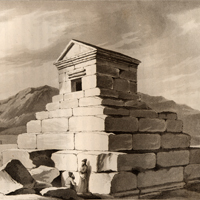
program and website founded by Pierre Briant
The Achaemenid Persian Empire
from the Bosphorus to the Indus
river, from 550 to 330 B.C.
from the Bosphorus to the Indus
river, from 550 to 330 B.C.
search
Publications
Achaemenid museum and Iconographic resources
Textual sources
my space
You are not connected
I have my space
Please enter your identifiers to connect to your space
I forgot my password
You will be sent your password
Please type your emai.l
I create my space
Please type your email and a password of at least 6 characters to create your space.
Processing...
Change my password
Please type your password et a new one with at least 6 characters.
Change my email
Please type your password and a new valid email
back to folders

x
Créer mon espace
En créant votre espace vous pouvez mémoriser les fiches de manière permanente et les rappeler d'une session l'autre.
- Cliquez sur l'onglet "Je n'ai pas d'espace".
- Saisissez votre adresse mail et un mot de passe d'au moins 6 caractères.
- Cliquez sur le bouton "créer".
- Une demande de confirmation vous sera envoyée par mail. Vous devrez cliquer sur le lien interne afficher dans ce mail pour activer votre espace.
Modifier mes identifiants
Vous devez auparavant être connecté à votre espace.
- Cliquez sur votre email qui apparaît en haut à gauche du panneau "mon espace".
- Pour changer votre mot de passe cliquez sur l'onglet "Changer mon mot de passe".
- Pour changer votre adresse mail cliquez sur l'onglet "Changer mon email".
 Créer un dossier
Créer un dossier
Vous pouvez classer vos fiches dans des dossiers. Pour Créer un dossier :
- Cliquer sur ce bouton pour créer un nouveau dossier.
- Saisissez un nom de dossier.
- Cliquez sur le bouton "ok" pour créer le dossier.
- Cliquez sur le bouton "-" ou "x" pour abandonner la procédure.
 Renommer un dossier
Renommer un dossier
- Cliquer sur ce bouton pour éditer le nom du dossier.
- Saisissez un nouveau nom.
- Cliquez sur le bouton "ok" pour enregistrer la modification.
- Cliquez sur le bouton "-" pour abandonner la procédure.
 Supprimer un dossier
Supprimer un dossier
Cette action supprime toutes les fiches mémorisées dans le dossier.
- Cliquer sur ce bouton pour supprimer le dossier.
- Cliquez sur le bouton "-" pour abandonner la procédure.
- Cliquez sur le bouton "x" pour supprimer la procédure.
 Mémoriser une fiche
Mémoriser une fiche
Depuis la fiche :
- Cliquer sur ce bouton situé en haut à droite de la fiche.
- Dans la liste déroulante qui apparaît à côté du bouton, sélectionnez le dossier dans lequel vous souhaitez enregistrer la fiche .
- Le message "document enregistré" apparaît en remplacement de la liste pour vous confirmer que l'action a été effectuée.
 Déplacer une fiche
Déplacer une fiche
Depuis mon espace :
- Ouvrez le dossier où se trouve la fiche à déplacer en cliquant sur le nom du dossier.
- Cliquez sur la petite flèche en haut à droite du contenu du dossier.
- Dans la liste qui se déroule, cliquez sur le dossier de destination.
 Supprimer une fiche
Supprimer une fiche
Depuis mon espace :
- Ouvrez le dossier où se trouve la fiche à supprimer en cliquant sur le nom du dossier.
- Cliquez sur la petite flèche en haut à droite du contenu du dossier.
- Dans la liste qui se déroule, cliquez sur "supprimer ce document".
textual sources
-
texts by languages and scripts
-
-
-
babylonian
-
-
-
-
-
-
-
-
-
-
Babylonian
The thousands of Babylonian texts form an extremely varied corpus that documents individual destinies and collective activities alike. This documentation is of a legal, administrative and socio-economic nature and is spread over a large number of archives on clay tablets, the most significant of which come from two types of sources.
the sanctuary archives
Ebabbar, the temple of the god Šamaš at Sippar in northern Babylonia, and Eanna, the temple of the goddess Ištar at Uruk in the south, produced texts that are highly representative of the diversity of administrative practices and daily administration.
They are also good testaments to the power maintained by the great institutional organisations under the joint control of the official administration and the local notables. These two archives show no break with the previous neo-Babylonian period, but they both stop around the early 5th century BC.
the private archives
A few major private archives of entrepreneurs document the multifarious activities and the family lives of city notables who often served the Crown in the 5th and 4th centuries BC, in Babylon (Egibi family) or in Nippur (Murašû family).
The political upheavals experienced in Babylonia at the start of Xerxes’s reign provoked a major break, putting a stop to most of the major private archives in the Babylon region, with the exception of those found in the old royal palace (Kasr archive); the situation at Nippur, Uruk or Ur seems to have been less dependent on political ups and downs.
Francis Joannès (université Paris 1) / February 2014
Achemenet in Korp 2020
The on-line Achemenet Babylonian texts are now also available as a linguistic text corpus “Achemenet in Korp 2020” at http://urn.fi/urn:nbn:fi:lb-
Using the Achemenet text corpus in Korp allows extensive searches on the texts and presents the results as a KWIC concordance list. No installation of software is needed. It also offers statistical information on the search results and enables the user to download them. The corpus is currently available for beta testing, and the final version will be published later this year.
For more information, please visit the metadata page for “Achemenet in Korp 2020” at http://urn.fi/urn:nbn:fi:lb-
Saana Svärd (University of Helsinki) / July 2023





 rss
rss twitter
twitter